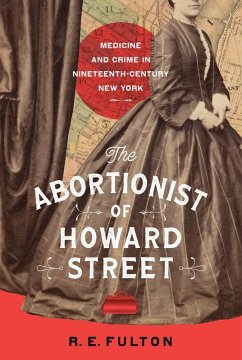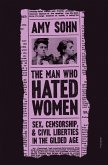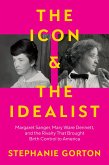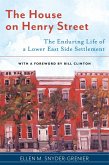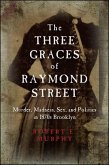Josephine McCarty had many identities. But in Albany, New York, she was known as "Dr. Emma Burleigh," the abortionist of Howard Street.
On January 17, 1872, McCarty boarded a streetcar in Utica, New York, shot her ex-lover in the face, and disembarked, unaware that her bullet had passed through her target's head and into the heart of the innocent man sitting beside him. The unlucky passenger died within minutes. Josephine McCarty was arrested for attempted murder and quickly became the most notorious woman in central New York.
The Abortionist of Howard Street was, however, far more than a murderer. In Maryland she was "Johnny McCarty," a blockade runner and spy for Confederate forces. New Yorkers whispered of her as a mistress to corrupt Albany politicians. So who was she?
The prosecution in her murder trial claimed she was a calculating and heartless operative both in the bedroom and in her public life. Or was she the victim of ill fortune and the systemic weight of misogyny and male violence? The answer, of course, was not as simple as either narrative. In this absorbing and rich history, R.E. Fulton considers the nuances of Josephine McCarty's life from marriage to divorce, from financial abuse to quarrels with intimate partners and more, trying to decipher the truth behind the stories and myths surrounding McCarty and what ultimately led her to that Utica streetcar with a pistol in her dress pocket.
In The Abortionist of Howard Street, Fulton revisites a rich history of women's experience in mid-nineteenth century America, revealing McCarty as a multifaceted, fascinating personification of issues as broad as reproductive health, education, domestic abuse, mental illness, and criminal justice.
On January 17, 1872, McCarty boarded a streetcar in Utica, New York, shot her ex-lover in the face, and disembarked, unaware that her bullet had passed through her target's head and into the heart of the innocent man sitting beside him. The unlucky passenger died within minutes. Josephine McCarty was arrested for attempted murder and quickly became the most notorious woman in central New York.
The Abortionist of Howard Street was, however, far more than a murderer. In Maryland she was "Johnny McCarty," a blockade runner and spy for Confederate forces. New Yorkers whispered of her as a mistress to corrupt Albany politicians. So who was she?
The prosecution in her murder trial claimed she was a calculating and heartless operative both in the bedroom and in her public life. Or was she the victim of ill fortune and the systemic weight of misogyny and male violence? The answer, of course, was not as simple as either narrative. In this absorbing and rich history, R.E. Fulton considers the nuances of Josephine McCarty's life from marriage to divorce, from financial abuse to quarrels with intimate partners and more, trying to decipher the truth behind the stories and myths surrounding McCarty and what ultimately led her to that Utica streetcar with a pistol in her dress pocket.
In The Abortionist of Howard Street, Fulton revisites a rich history of women's experience in mid-nineteenth century America, revealing McCarty as a multifaceted, fascinating personification of issues as broad as reproductive health, education, domestic abuse, mental illness, and criminal justice.
Dieser Download kann aus rechtlichen Gründen nur mit Rechnungsadresse in A, D ausgeliefert werden.

